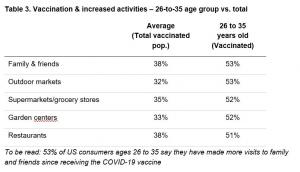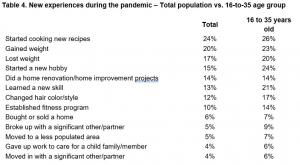Optimism is on the rise among US consumers; but 57% say they will be cautious about going back out
New GfK study also shows that vaccinated people are thinking and acting differently than non-vaccinated
NEW YORK, NY, UNITED STATES, April 27, 2021 /EINPresswire.com/ -- Roughly one year after COVID-19 transformed almost every aspect of life, some US consumers are daring to feel optimistic about their health, finances, and careers. But 57% also report that they will be cautious about going back out into the world – more than double the proportion who say they “can’t wait” to get out and do the things they have been missing.Click here to register for GfK's April 29th virtual learning session: "How Brands Can Win Consumer Hearts in the New Marketplace"
In the latest installment of GfK’s Consumer Pulse research – tracking people’s evolving reactions to the pandemic – Americans report that, compared to a year ago, they are substantially less worried about the health of the people around them, the loss of personal freedoms, and the impact of a weak economy on their households. (See Table 1.)
In addition, of those who experienced a change in work situation due to the pandemic, 28% say their reduction of work hours has ended and they have returned to full time.
More than half will return slowly
But 57% of Americans also say they are going to be cautious about going back out into the world – compared to just 21% who can’t wait to get out and do the things they have been missing. Surprisingly, those who have been vaccinated against COVID-19 are more likely to say they will be careful, compared to those who have not received the vaccine (64% vs. 55%).
In addition, 49% of those who have not been vaccinated report that they are “living normally” – as they did before the pandemic – compared to 61% of vaccinated Americans. Among those who say they are living normally now, 42% of the non-vaccinated report that they have been doing so throughout the pandemic, while 53% of vaccinated consumers only began living that way within the past two months.
Looking forward to more friends and family, fewer protocols
Vaccinated and non-vaccinated consumers also differ to some degree on the activities they are looking forward to resuming. While both groups placed visiting friends and family at the top of their lists, it was a more decisive winner among vaccinated people; for the non-vaccinated, not having to wear a mask ranked a close second, and not having to socially distance came in third. (See Table 2.)
Vaccination increases activity
GfK also found that Americans in the 26 to 35 age group who are vaccinated are more likely than other age groups to be increasing visits to the homes of family and friends, supermarkets/grocery stores, and other locations. (See Table 3.)
Many will emerge transformed
Many people also reported that they have had a variety of new, potentially life-changing experiences during the pandemic, from gaining or losing weight to remodeling their homes. Gen Z and younger Millennials were more likely than consumers in general to engage in several types of personal improvement over the past year. (See Table 4.)
“Despite having their whole worlds turned upside down in the last year, young people managed to do what young people always do, which is experiment with new things,” said Stacy Bereck, Managing Director of Consumer Insights and Sales Effectiveness for GfK North America. “A sizable group will emerge post-pandemic with new skills or hobbies or with a change in personal appearance. This is just one, very specific way that COVID-19 has transformed consumers’ lives and behavior in ways that may never be undone – and that are essential for brands and marketers to understand.”
The survey was conducted March 15th to 24th among 1,021 US consumers ages 18 to 65.
David Stanton
GfK
+1 908-875-9844
email us here




